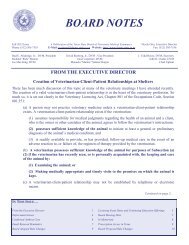TEXAS BOARD OF VETERINARY MEDICAL EXAMINERS
TEXAS BOARD OF VETERINARY MEDICAL EXAMINERS
TEXAS BOARD OF VETERINARY MEDICAL EXAMINERS
Create successful ePaper yourself
Turn your PDF publications into a flip-book with our unique Google optimized e-Paper software.
§573.17. Dentistry.<br />
(a) Definitions. Dentistry is the practice of veterinary medicine and means the application or<br />
use of any instrument or device to any portion of any animal's tooth, gum or any related<br />
tissue for the prevention, cure or relief of any wound, fracture, injury, disease or other<br />
condition of an animal's tooth, gum or related tissue. Dentistry may include the use of<br />
sedation or anesthesia to accomplish a dental procedure by a licensed veterinarian. Dentistry<br />
includes, but is not limited to:<br />
(1) "Preventive dental procedures" including, but not limited to, the removal of calculus,<br />
soft deposits, plaque, and stains, above the gum line or the smoothing, filing or polishing<br />
of tooth surfaces above the gum line;<br />
(2) "Equine teeth floating" defined as the smoothing, filing and polishing of the sharp<br />
projections or points of the teeth of animals;<br />
(3) "Operative dentistry/oral surgery" or any other dental procedure that invades the hard<br />
or soft oral tissue including a procedure that alters the structure of one or more teeth, or<br />
repairs damaged and diseased teeth, or the deliberate extraction of one or more teeth.<br />
(b) Supervision. Any non-licensee may perform animal teeth floating only if they are under<br />
the appropriate level of supervision of a licensed veterinarian as determined by the licensed<br />
veterinarian. The Supervision requirements of other dental activities are as determined by<br />
§573.10 of this title (relating to Supervision of Non-Licensed Employees.)<br />
(c) Responsibility. When equine teeth floating is performed by a non-licensee, the board will<br />
hold the licensee supervising the non-licensee responsible for the standard of care provided<br />
by the non-licensee. The board expects the non-licensee to practice at the same standard of<br />
care the licensed veterinarian would be required to provide to the public.<br />
(d) Prohibited acts. Any non-licensee who practices any other dental procedures on animals<br />
in a manner inconsistent with this rule shall be in violation of this rule and the Texas<br />
Veterinary Licensing Act.<br />
This rule is effective on July 1, 2011.




